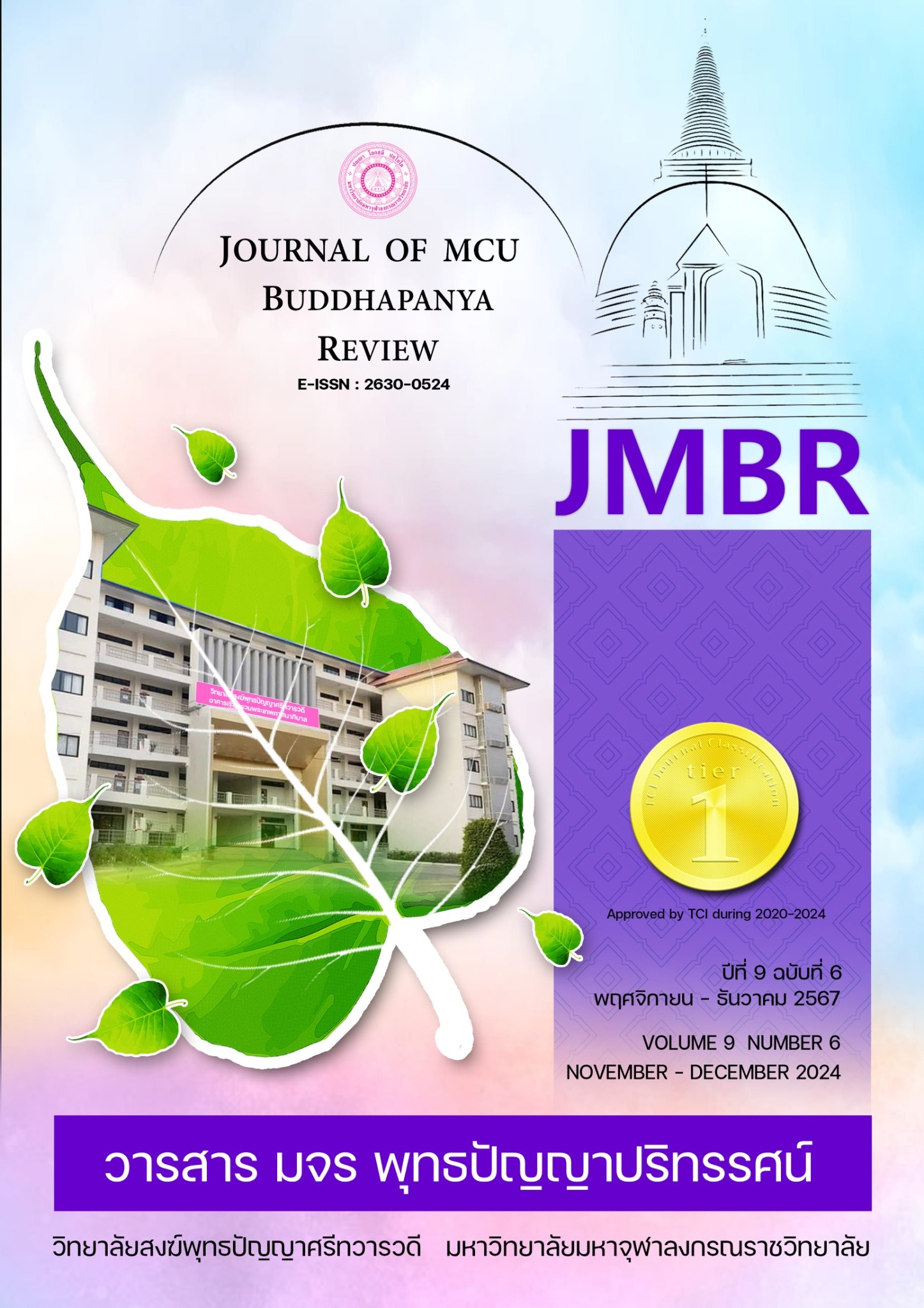นวัตกรรมการพัฒนาหลักสูตรสถานศึกษาโปรแกรมทวิภาษา ภายใต้ภาวะผู้นำการจัดการการเปลี่ยนแปลงของผู้บริหารสถานศึกษา
คำสำคัญ:
ภาวะผู้นำการจัดการการเปลี่ยนแปลง, นวัตกรรมการพัฒนาหลักสูตรสถานศึกษา โปรแกรมทวิภาษาบทคัดย่อ
บทความนี้มีวัตถุประสงค์ 1) เพื่อศึกษาภาวะผู้นำการจัดการเปลี่ยนแปลงของผู้บริหารสถานศึกษาที่มีต่อการสร้างนวัตกรรมการพัฒนาหลักสูตรสถานศึกษาโปรแกรมทวิภาษา 2) เพื่อสร้างนวัตกรรมการพัฒนาหลักสูตรสถานศึกษาโปรแกรมทวิภาษาภายใต้ภาวะผู้นำการจัดการเปลี่ยนแปลงของผู้บริหารสถานศึกษา และ 3) เพื่อทดลองใช้นวัตกรรมหลักสูตรสถานศึกษาโปรแกรมทวิภาษาภายใต้ภาวะผู้นำการจัดการเปลี่ยนแปลงของผู้บริหารสถานศึกษา เป็นการวิจัยแบบวิจัยและพัฒนา ได้ศึกษาแนวคิดภาวะผู้นำการจัดการการเปลี่ยนแปลงของ Schratz & Schley, 2014; The Corum Consultancy Ltd. Company, 2023 และการพัฒนาหลักสูตรสถานศึกษาของ Vijayalakshmi,(2020) เป็นกรอบการวิจัย มีขั้นตอนในการดำเนินการวิจัย คือ ขั้นตอนที่ 1 การยืนยันองค์ประกอบภาวะผู้นำการจัดการการเปลี่ยนแปลงของผู้บริหารสถานศึกษาที่มีต่อการสร้างนวัตกรรมการพัฒนาหลักสูตรสถานศึกษาโปรแกรมทวิภาษา ขั้นตอนที่ 2 การสร้างนวัตกรรมการพัฒนาหลักสูตรสถานศึกษาโปรแกรมทวิภาษาภายใต้ภาวะผู้นำการจัดการเปลี่ยนแปลงของผู้บริหารสถานศึกษา และขั้นตอนที่ 3 การทดลองใช้นวัตกรรมหลักสูตรสถานศึกษาโปรแกรมทวิภาษาภายใต้ภาวะผู้นำการจัดการเปลี่ยนแปลงของผู้บริหารสถานศึกษา วิเคราะห์ข้อมูลโดยใช้สถิติพื้นฐาน คือ ค่าเฉลี่ย และค่าเบี่ยงเบนมาตรฐาน สถิติอ้างอิง คือการเปรียบเทียบความแตกต่างระหว่างค่าเฉลี่ย ผลการวิจัยพบว่า
- ผู้บริหารสถานศึกษาโรงเรียนอนุบาลประเภททวิภาษามีความเห็นว่าภาวะผู้นำการจัดการเปลี่ยนแปลงของผู้บริหารสถานศึกษาที่มีต่อการสร้างนวัตกรรมการพัฒนาหลักสูตรสถานศึกษาโปรแกรมทวิภาษามีความสำคัญที่เป็นไปได้ในทางปฏิบัติในภาพรวมอยู่ในระดับมากที่สุด
- นวัตกรรมการพัฒนาหลักสูตรสถานศึกษาโปรแกรมทวิภาษาภายใต้ภาวะผู้นำการจัดการเปลี่ยนแปลงของผู้บริหารสถานศึกษามี 5 ขั้นตอน คือ 1) การเลือกเพื่อกำหนดจุดประสงค์ เป้าหมาย และวัตถุประสงค์ของการจัดทำหลักสูตร 2) การเลือกและกำหนดประสบการณ์การเรียนรู้ 3) การเลือกและกำหนดเนื้อหาในการเรียนรู้ 4) การบูรณาการระหว่างประสบการณ์และเนื้อหาในการเรียนรู้และ 5) การประเมินผล
- หลังทดลองใช้นวัตกรรมหลักสูตรสถานศึกษาโปรแกรมทวิภาษาภายใต้ภาวะผู้นำการจัดการเปลี่ยนแปลงของผู้บริหารสถานศึกษาในโรงเรียนอนุบาลคิราคิราคิดส์ นานาชาติของนักเรียนชั้นอนุบาล 1 (K1) มีคะแนนผลการเรียนรู้สูงกว่าก่อนทดลองใช้ = 1.20 คะแนน
องค์ความรู้จากงานวิจัยนี้ โรงเรียนอนุบาลคิราคิราคิดส์ นานาชาติได้นวัตกรรมการพัฒนาหลักสูตรสถานศึกษานำไปสู่หลักสูตรสถานศึกษาตามมาตรฐานโรงเรียนอนุบาลของประเทศญี่ปุ่น ซึ่งทางโรงเรียนสามารถนำไปใช้เป็นกรอบในการพัฒนานักเรียน
เอกสารอ้างอิง
Allen, I. E., & Seaman, J. (2017). What we teach: K-12 school district curriculum adoption process. Babson Survey Research Group. Retrieved April 25, 2020, from https://www.onlinelearningsurvey.com/reports/k12oer2017/whatweteach_2017.pdf.
Asada, T. & Iwahama, R. (2006). A model of school system to develop the school-based
curriculum and support CPD using reflection and action research. Retrieved April 25,
, from http://www.leeds.ac.uk/bei/Education-line/browse/all_items/159421.html
Bolstad, R. (2004). School-based curriculum development: Principle, process, and practices.
Retrieved April 25, 2020, from https://www.nzcer.org.nz/system/files/1314bib.pdf
Connecticut. Bureau of Curriculum and Instruction. (2006). A guide to curriculum
development-purposes, practices, procedures. Retrieved April 25, 2020, from
http://cslib.contentdm.oclc.org/digital/collection/p128501coll2/id/101716/
Cooper, H., Allen, B.A., Patall, A.E., and Dent, L.A., (2010). Effects of Full-Day Kindergarten on
Academic Achievement and Social Development. American Educational Research
Association, 80 (1), 34-70,
The Corum Consultancy Ltd. Company. (2023). Corum's change leadership model. Retrieved
January 25, 2023, from http://www.corumconsultancy.com/change-leadership-model.html
The Curriculum Development Council. (2017). Kindergarten Education. Curriculum Guile.
Joyful Learning through Play Balanced Development All the Way. Retrieved April 25,
, from https://www.edb.gov.hk/attachment/en/curriculum- development/major-
level-of-edu/preprimary/ENG_KGECG_2017.pdf
Curriculum and Instruction Steering Committee. (2018). Adoption Toolkit: History-Social Science.
Retrieved April 25, 2020, from http://www. ccsesa.org/wp-content/ uploads/2018/02/
HSS-Toolkit-FINAL.pdf
Lange, D. (1988). Tomorrow’s schools: The reform of education administration in New
Zealand. V. R. Ward, Government Printer.
Howard, E. R., Sugarman, J., Christian, D., Lindholm-Leary, K. J., & Rogers, D (2007). Guiding
principles for dual language education. Retrieved April 25, 2020, from
https://www.cal.org/twi/Guiding_Principles.pdf
Hwee, L.M., & Muhamad Taha, F.B. (2019). Principals and supervisors as curriculum leaders.
Pre-School Education Branch, Ministry of Education. Retrieved April 25, 2020, from
http://www.ecda.gov.sg/growatbeanstalk/Documents/ ECCC%202015/ECCC2015%20 Concurrent%20Workshops/Concurrent%20Workshops%20C/C6%20Curriculum%20
Leadership.pdf.
Law, E. (2001). Impacts of a school based curriculum project on teachers and students: A
Hong Kong case study. In M. Brennan (Ed.), Education futures & new citizenships:
Proceedings of the 10th National Biennial Conference of the Australian Curriculum
Studies Association (Vol. 1, pp. 335-355). Canberra, Australian Capital Territory:
Australian Curriculum Studies Association.
Mareeya Dumrongphol and Piyapong Sumettikoon. (2015). Image Management Strategies of
International Kindergartens in Bangkok. An Online Journal of Education. 10(3), 299-311.
Minnesota Department of Education. (2018). Change leadership, A guide for school leaders: Understand how change affects others. Retrieved April 25, 2020, from https://education.mn.gov/mdeprod/idcplg?idc%20Service=GET
Naperville Community Unit School District 203. (2020). Curriculum innovation development
overview: Retrieved May 22, 2023, from http://www. Naperville203.org
October, S. (2009). Principals as curriculum leader during a time of educational change.
Thesis Master of Education (Curriculum Studies) of Stellenbosch University.
OECD. (1979). School-based curriculum development/ Centre for Educational Research and Innovation (CERI). Paris: Organization for Economic Co-operation and Development
OECD)
Office of the Private Education Commission. (2016). List of private International School. Retrieved April 25, 2020, from http://sites.google.com/a/opec.go.th/opec/list-name- school.
Pritchard, B. (2010). Change management from an engineers perspective. Change
Management. Retrieved August 27, 2020, from https://irc.queensu.ca/articles/change-
management-engineers-perspective.
Schratz, M., & Schley, W. (2014). Educational Leaders as Change Agents in System Development :The Austrian Leadership Academy. Retrieved May 22, 2023, from
https://doi:10.1007/978-94-007-1350-5_17
Sinay, E., Ryan, T. G., & Walter, S. (2016). Research series on school effectiveness and school
improvement: Goal setting. (Research Report No. 16/17-05). Toronto, Ontario, Canada:
Toronto District School Board
Texas Center for District and School Support. (2019). Critical Success Factors. Retrieved April
, 2020, from http: //www.tcdss.net/critical_success_factors/index
Tokai, K. (2008). Course of study for Kindergarten. Retrieved May 22, 2023, from http://www.mext.go.jp/component/english/__icsFiles/afieldfile/2011/04/07/1303755_002.pdf
Vijayalakshmi, M. (2020). Process of Curriculum Development. Retrieved April 25, 2020, from
https://www.slideshare.net/Vijirayar/process-of-curriculum-development-56873412.
Zen, E.L. (2017). SA close look at bilingualism research in Asia. Indonesian Journal of Applied Linguistics, 7(2). dx.doi.org/10.17509/ijal.v7i2.8133
ดาวน์โหลด
เผยแพร่แล้ว
รูปแบบการอ้างอิง
ฉบับ
ประเภทบทความ
สัญญาอนุญาต
ลิขสิทธิ์ (c) 2025 วารสาร มจร พุทธปัญญาปริทรรศน์

อนุญาตภายใต้เงื่อนไข Creative Commons Attribution-NonCommercial-NoDerivatives 4.0 International License.



